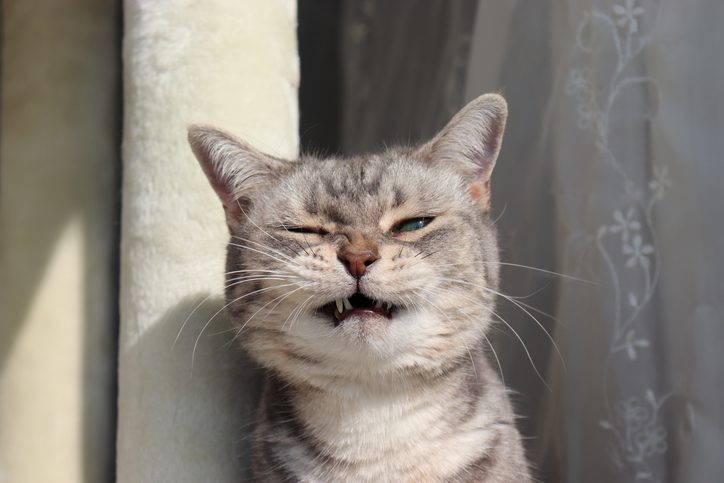Why is My Cat Sneezing in Limerick, PA?
If you own a cat, you know that it can be hard to tell when they are not feeling well. Cats are good at keeping things from us, and they tend to hide that they are sick until their symptoms progress to the point that they are obvious. If your cat has been sneezing, you might be wondering if you should be concerned about their well-being or overall health.
Cats can sneeze for many reasons, and these reasons can vary in severity. You will want to keep reading to find out more about the common reasons for cat sneezing so that you can determine when your cat needs to see the vet. Being able to recognize the symptoms of these kinds of conditions can help your cat to get treatment promptly when they need it.

1. Respiratory Infection
Cats can get a cold just like people, and this can make them sneeze. Cats with upper respiratory infections might also have discharge from their nose and weepy eyes. If your cat seems to be lethargic and has lost interest in food and water, you might need to get them to the veterinarian right away. Also make sure that you listen to their breathing to keep an eye out for secondary lung infections related to their cold symptoms.
Cats can get quite sick from colds, and secondary infections are not at all uncommon when cats contract a cold. Being aware of things like sneezing and having trouble breathing can help ensure that your cat gets the treatment that they need for a more severe cold with a secondary infection.
2. Normal Sneezing
Cats can sneeze when there is dust in the air, when they are playing with one another, or even when they are grooming. Normal sneezes might happen from time to time but should not be associated with any secondary symptoms like a snotty nose or weeping eyes. Paying attention when your cat seems to be sneezing more than usual can be a good idea as this might indicate other problems that your cat is having with their health.
Don’t be worried about the occasional sneeze but do pay attention if your cat starts to sneeze more regularly than they used to.
3. Allergies
Cats can have allergies to things in their environment, just like people. If your cat is allergic to plants in your home or even one of the other pets that live with you, they might sneeze frequently. Sneezing like this can also include symptoms like runny eyes and a snotty nose, which can make allergic reactions look like a cold.
Your vet can determine if your pet has allergies or a cold and can help you to get your pet onto the right medications to help treat their allergies. You should also start to identify possible causes for their allergies, such as a change in food or dust in your home. Removing the source of the allergic reaction can help your cat to stop sneezing and feel much better.
4. Feline Herpes
Feline herpes is not caused by the same virus that impacts humans. This virus will require lifelong treatment once a cat has contracted it. One of the earliest symptoms of this condition is sneezing and a snotty nose that does not improve with the usual cold treatments.
Cats will have flares of this virus throughout their life, characterized by periods where they suffer from respiratory illness, among other symptoms. The earlier that you get your cat treatment for Feline Herpes, the better their quality of life will be over the long term. This condition can be managed, but you will need to be prepared to offer a cat with Feline Herpes more supportive care than your other cats.
5. Feline Immunodeficiency Virus (FIV)
This virus is the feline version of the human HIV virus. Cats cannot transmit this virus to humans, and they cannot catch human HIV. When a cat has FIV, their immune system will be impaired, which can lead to all kinds of health problems. One of the most common struggles for cats with FIV is recurring upper respiratory infections.
Cats with FIV can suffer from other symptoms related to this condition as it progresses, which is why it is important to have your cat diagnosed early. Your vet will likely test for this condition if your cat has more than one upper respiratory infection over a short period of time.
6. Dental Disease
Believe it or not, dental problems can lead to sneezing in cats. When the teeth and the gums are not healthy, cats can get respiratory infections. They might also suffer from enough discomfort that they sneeze when they are eating due to the pain in their mouth. Be sure that you provide your cat with regular dental cleanings at the vet and that you keep track of behavior that might indicate that their teeth are hurting them.
Your vet can diagnose dental disease and can help your cat feel better by providing professional teeth cleaning and potentially removing loose or broken teeth.
Cat Sneezing Can be Caused by Many Conditions
Since cat sneezing can be linked to so many different health conditions, you will want to be sure that you take your cat to see the vet if they have been sneezing a lot. Book an appointment at Limerick Veterinary Hospital by calling (610) 489-2848 or using the online form. Your vet will look at their teeth, and they might also do tests for FIV and for Feline Herpes. The sooner that you catch most of these health conditions, the better when it comes to treating them.
Your vet will be able to recommend the right treatment protocol for any of these conditions and help you to get your cat feeling good again. Sneezing might not seem like that big of a deal, but when your cat is dealing with a snotty nose, and they don’t feel very good, they might not eat and drink enough. It’s always worth attending to constant sneezing to make sure that your cat is not suffering from a serious illness that needs treatment.
